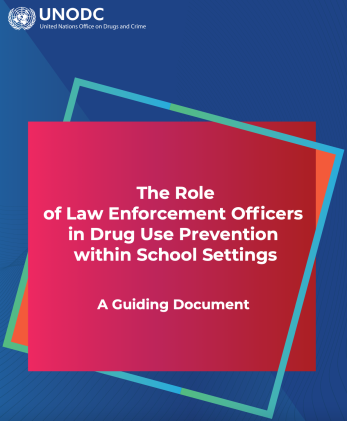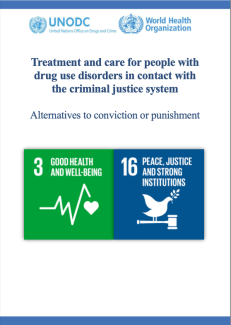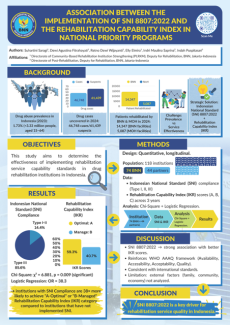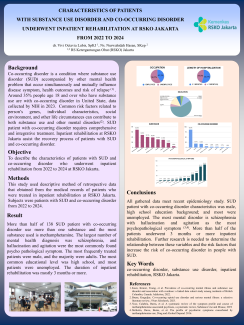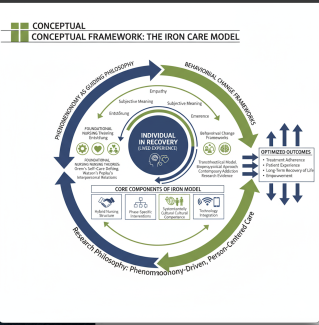Поиск
Reduce Drug Related Crime
Community-based treatment, care, and supervision for people with substance use problems who are involved with the justice system.
Treatment and Care for People with Drug Use Disorders in Contact with the Criminal Justice System
The UNODC and WHO report Treatment and care for people with drug use disorders in contact with the criminal justice system: Alternatives to conviction or punishment examines how health-centred, evidence-based responses can be integrated...
Ilicit Trafficking Nexus: Ilicit Drugs, Human Trafficking, and Arms Trade in Asia
Panel Presented at Indonesia 2025 on the 18th of September 2025
Author: Augus Irianto
Abstract:
The escalating drug problem in Asia has evolved into a multidimensional threat that extends far beyond public health. Illicit drug...
Day 2, 08:00 - 09:00, Plenary 6: Reducing Drug-Related Crime in Asia
Panel Presented at Indonesia 2025 on the 18th of September 2025
Moderator: Michele Worobiec
Presentations:
Tery Zakier Muslim: Reducing Drug-Related Crime
Grace Sopacua: The Situation of Drugs Law Enforcement in Indonesia
Augus...
Day 1, 16:00 - 17:30, Plenary 4: Reducing Drug Related Crimes in the Community
Panel Presented at Indonesia 2025 on the 17th of September 2025
Moderator: Imelda Indriyani
Presentations:
Mirza Hapsari Massarapa: Reducing Drug-Related Crime: A Comprehensive Approach from the Indonesian Directorate General of...
ASSOCIATION BETWEEN THE IMPLEMENTATION OF SNI 8807:2022 AND THE REHABILITATION CAPABILITY INDEX IN NATIONAL PRIORITY PROGRAMS
Background:
In 2023, the prevalence of drug abuse in Indonesia among the population aged 15–64 years reached 1.73%, equivalent to 3.33 million people. This problem has prompted The National Narcotics Board (BNN) as a government agency which...
Characteristics of Patients with Substance Use Disorder and Co-occuring Disorder Underwent Inpatient Rehabilitation at RSKO Jakarta from 2022 to 2024
Co-occurring disorder is a condition where substance use disorder accompanied by other mental health problem that occur simultaneously and mutually influence disease symptom, health outcomes and risk of relapse. Around 35% people age 18 and...
The Integrated Recovery-Oriented Nursing (IRON) Care Model: A Theoretical Framework for Optimizing Addiction Treatment Outcomes
Abstract
Title: The Integrated Recovery-Oriented Nursing (IRON) Care Model: A Theoretical Framework for Optimizing Addiction Treatment Outcomes
Authors: Ahmad Muneer, MSc, RN; Hessa Abdel Qader, MSc, RN
Affiliations: Maudsley Health, Al...
Drug Treatment Courts: An Evidence-Based Review with Recommendations for Improvement
This policy brief by the Canadian Centre on Substance Use and Addiction critically evaluates the role and effectiveness of Drug Treatment Courts (DTCs) in Canada. DTCs are intended to divert individuals with substance use disorders (SUDs)...
NIJ’s Courts Research: Examining Alternatives to Incarceration for Veterans and Other Policy Innovation
This article presents key studies from the National Institute of Justice’s (NIJ) Courts Research Portfolio that examine pretrial, prosecution, and sentencing policies promoting alternatives to incarceration, such as Veterans Treatment...
Annotated Bibliography
This document highlights resources to support your work in reducing drug related crime.
Exploring the Impact of Technical Violations on Probation Revocations in the Context of Drug Court
ABSTRACT
Prior research indicates a large number of drug court participants commit technical violations, subsequently increasing the likelihood of revocation. However, there is limited research investigating the potential heterogeneous...
Effects of medication-assisted treatment on mortality among opioids users: a systematic review and meta-analysis
ABSTRACT
Opioid use disorder (OUD) is associated with a high risk of premature death. Medication-assisted treatment (MAT) is the primary treatment for opioid dependence. We comprehensively assessed the effects of different MAT-related...
Probation clients’ barriers to access and use of opioid use disorder medications
ABSTRACT
Background
There is a gap between evidence-based treatment with medications for opioid use disorders (OUDs) and current practices of probation departments who supervise individuals with OUDs. Many probationers with OUDs cannot...
Substance use profile, treatment compliance, treatment outcomes and related factors in probation: a retrospective file review
Abstract
Objective
In this study, we aimed to investigate the sociodemographic characteristics of the individuals who mandated to the probation unit as the substances they use, their compliance with the programs, treatment outcomes and...
Substance use treatment services utilization and outcomes among probationers in drug courts compared to a matched cohort of probationers in traditional courts
Abstract
Background and objectives: Drug courts provide an array of substance use treatments and community-based services for probationers struggling with substance use disorders. We assessed substance use treatment services utilization...
Effectiveness of a computerized motivational intervention on treatment initiation and substance use: Results from a randomized trial
Highlights
- Motivational computer intervention (MAPIT) increased treatment initiation at 2-month follow-up.
- The significance of MAPIT diminished by the 6-month follow-up.
- Motivational interviewing (MI) was not significant in any model. ...
Substance Involvement and Probation Outcomes: Evidence From a Cohort Study
Abstract
Substance use disorders are common among justice-involved populations, the majority of whom are under community supervision in the form of probation. Substance involvement can amplify the challenges of complying with requirements...
A randomized study of the use of screening, brief intervention, and referral to treatment (SBIRT) for drug and alcohol use with jail inmates
Abstract
Background
Screening, brief intervention, and referral to treatment (SBIRT) is an evidence-based practice that has been shown to reduce alcohol and drug use in healthcare, educational, and other settings, but research on the...
Electronic-Screening, Brief Intervention and Referral to Treatment (e-SBIRT) for Addictive Disorders: Systematic Review and Meta-Analysis
Abstract
Background: Addictive disorders are significant global public health burdens. Treatment uptake with these disorders is low and outcomes can be mixed. Electronic screening, brief intervention, and referral to treatment (e-SBIRT)...
Effect of screening, brief intervention and referral to treatment for unhealthy alcohol and other drug use in mental health treatment settings: a randomized controlled trial
Abstract
Aims
To test the efficacy of a brief intervention to reduce alcohol or drug use and to promote use of addiction services among patients seeking mental health treatment.
Design and setting
A multi-centre, longitudinal, two-group...
Поделитесь знаниями: Члены ISSUP могут размещать информацию в разделе "Обмен знаниями" - зарегистрируйтесь или станьте членом организации


